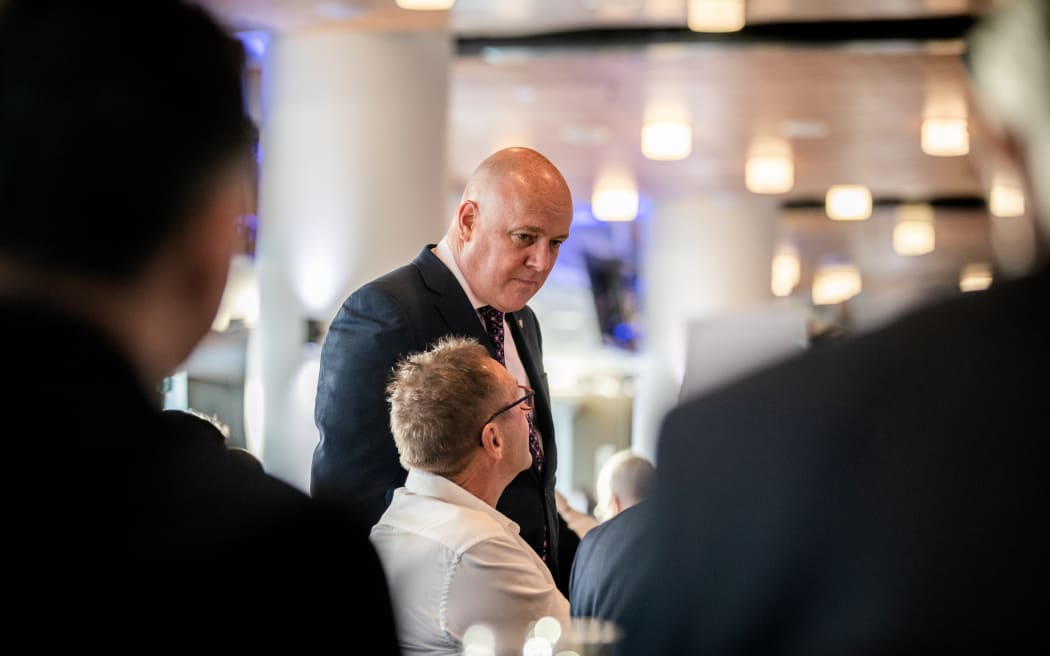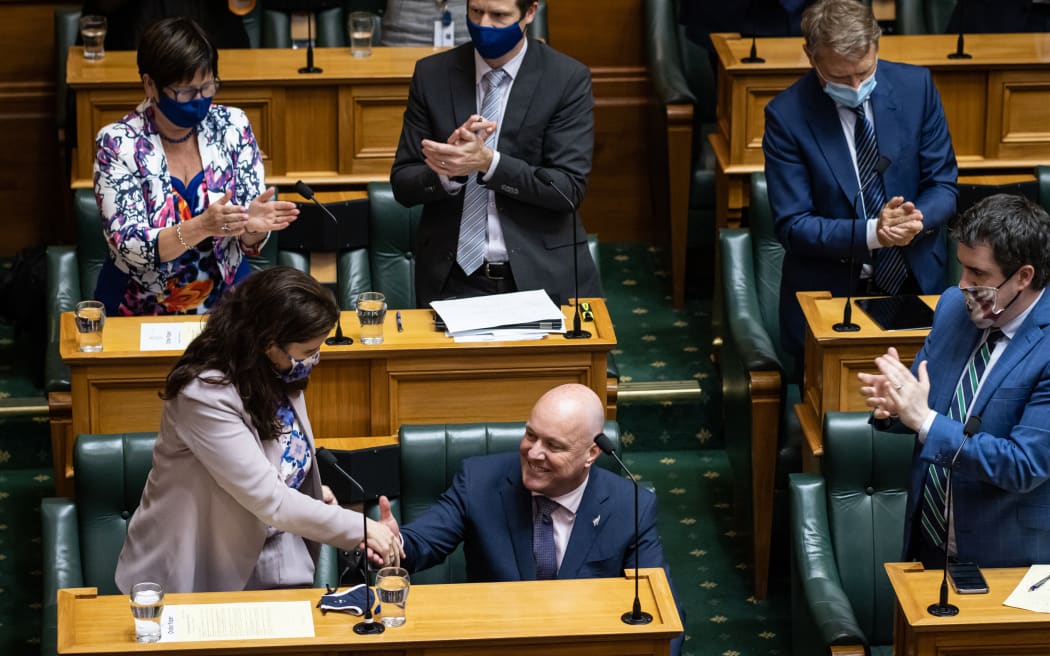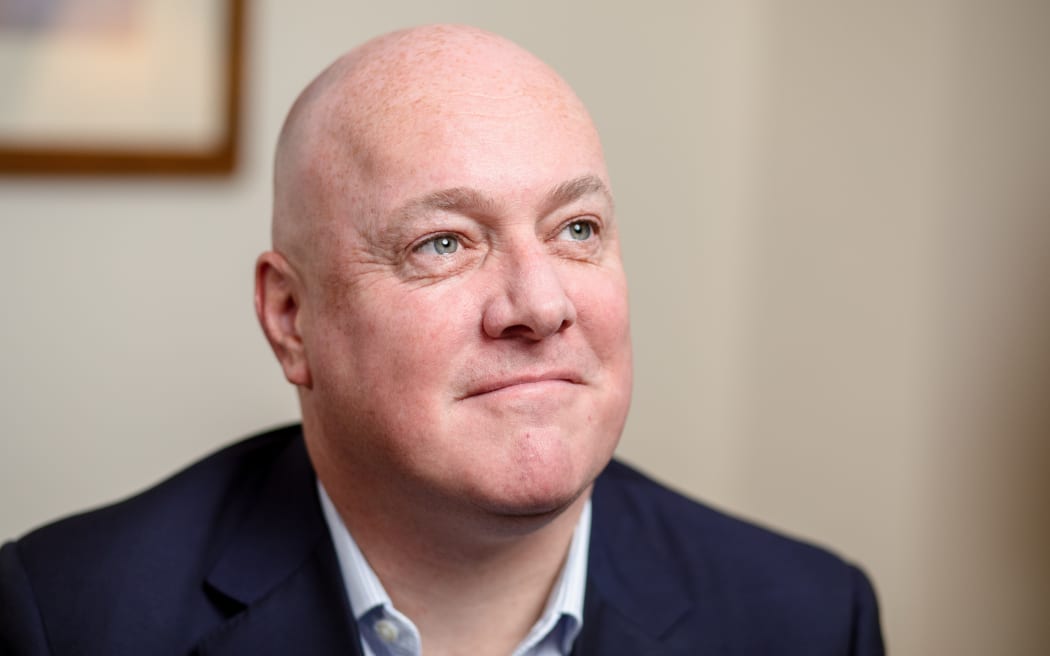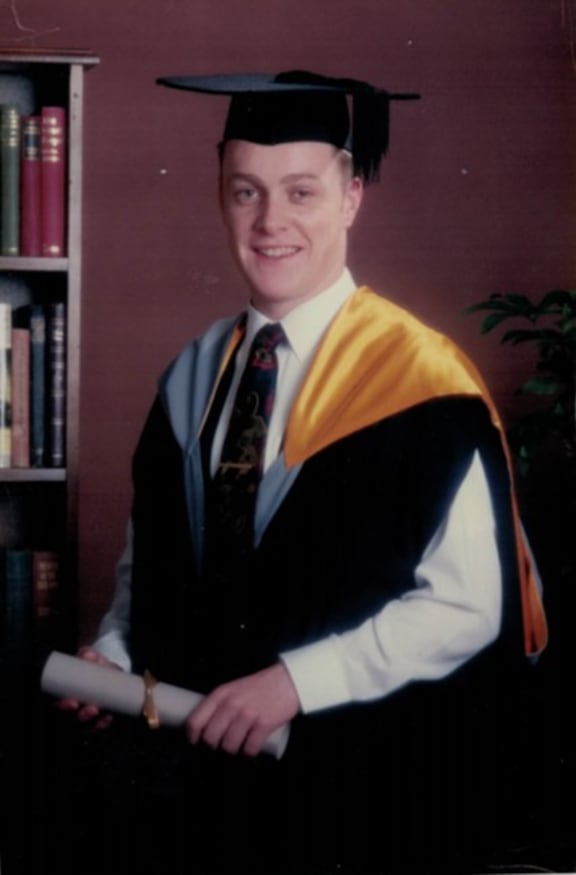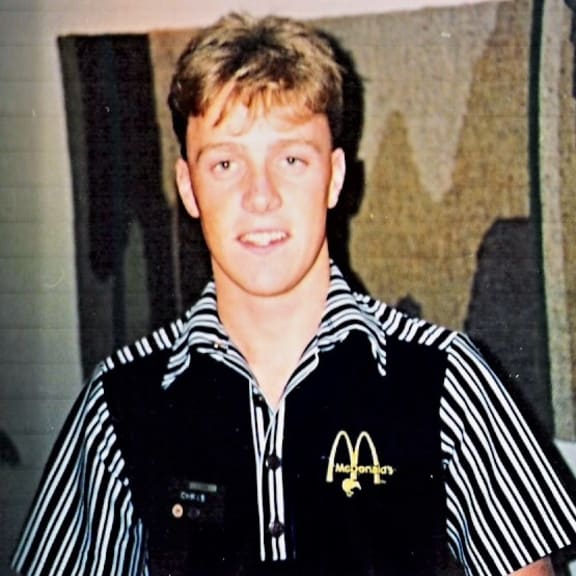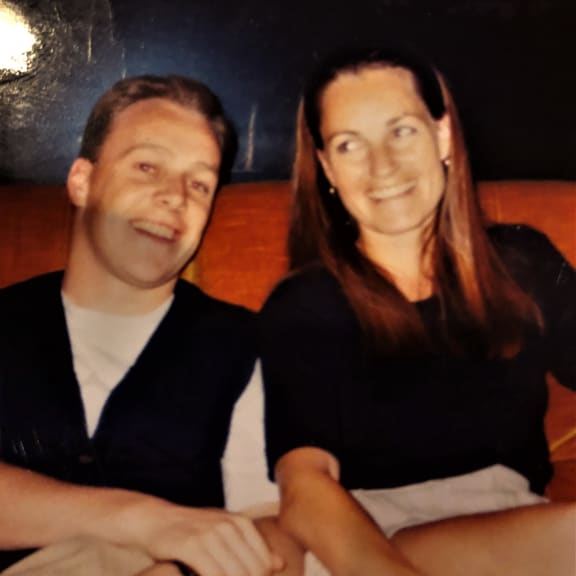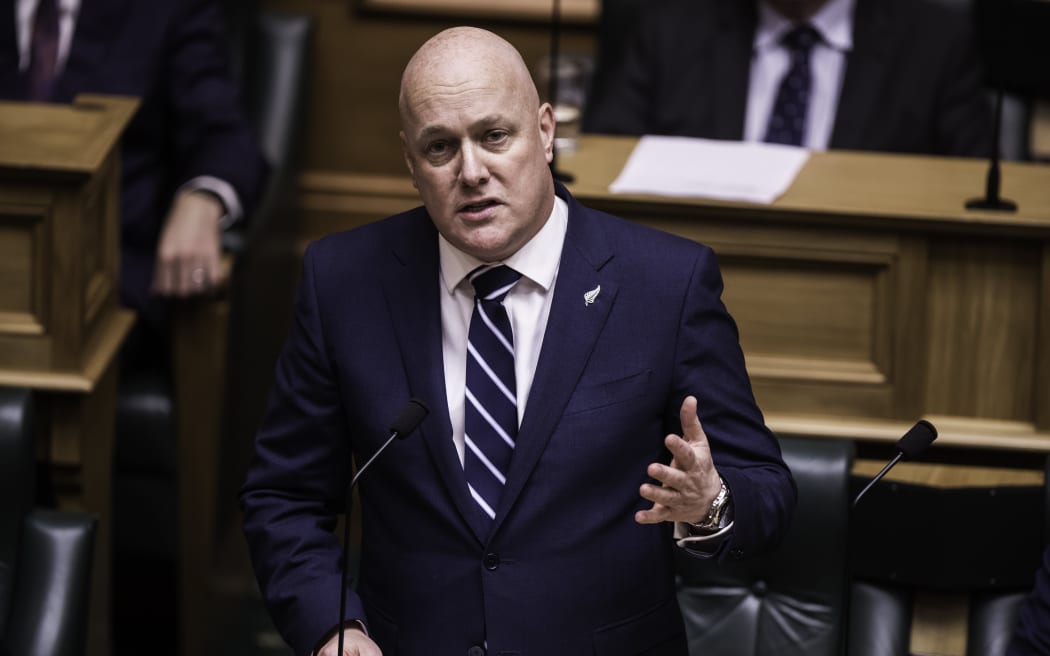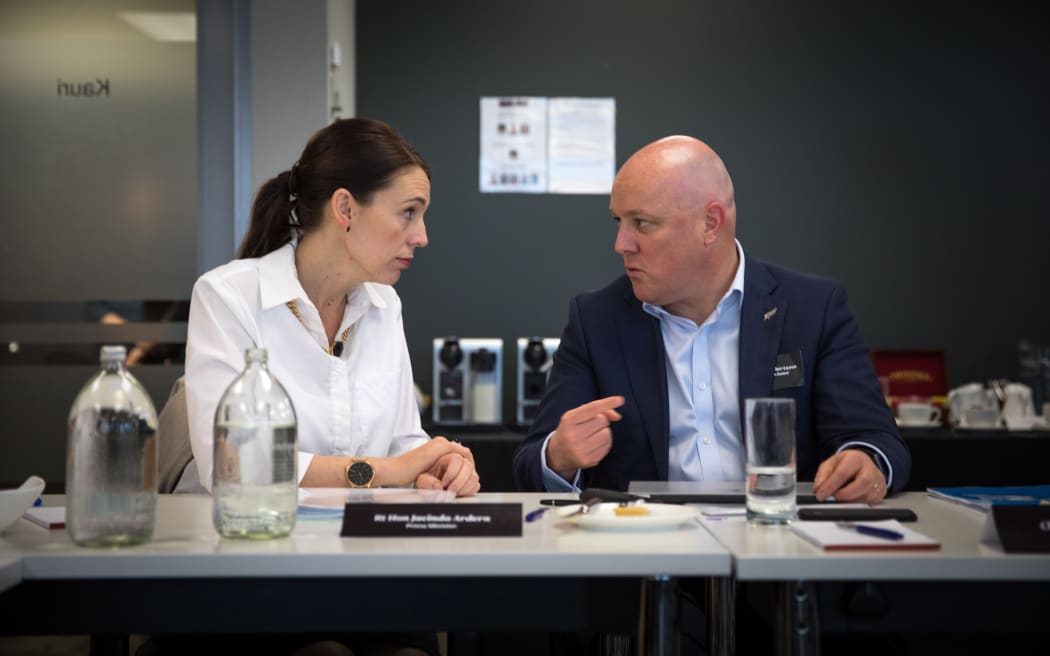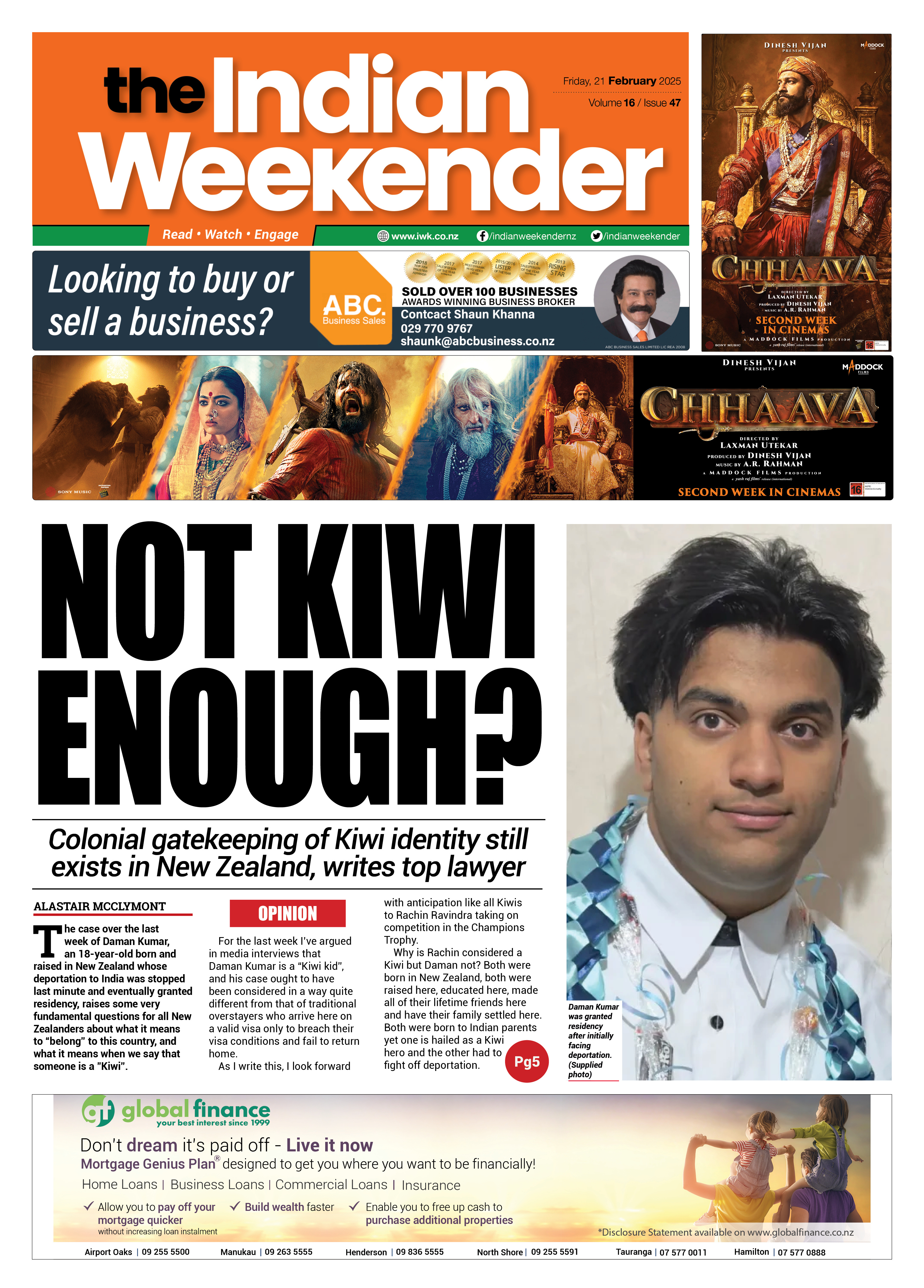How Christopher Luxon is rebranding the National Party
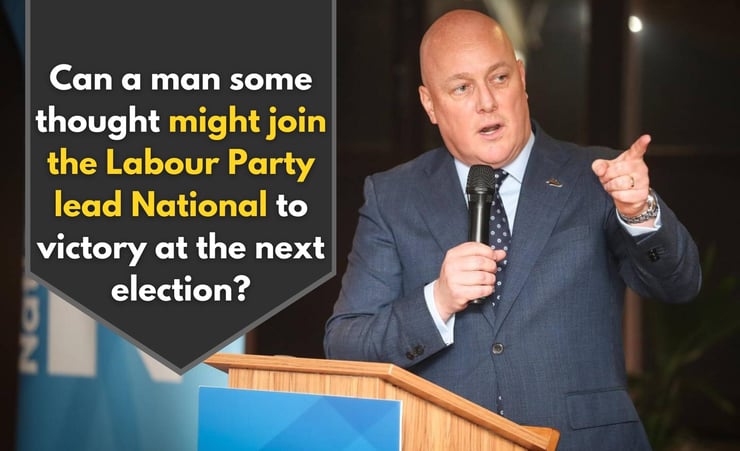
He's white, male, bald, rich and Christian, but he's also championed gender pay equity and the rainbow community, worked to halt human trafficking and environmentalists rate his climate change credentials. Can a man some thought might join the Labour Party lead National to victory at the next election?
He was Unilever's Vice President of Deodorant for North America. Now he wants to be Prime Minister of New Zealand.
He's a former brand manager, rebranding the National Party.
He's a reluctant fundamentalist with huge wealth and a poverty of Parliamentary experience.
He's Christopher Mark Luxon. But he's probably not the man you think he is.
Yes, he's white, male, rich, bald and Christian. He's even middle aged. But despite those sins perhaps there is an after-life, or at least a successful political life for Luxon, after his corporate conquests.
Environmentalists say he has impeccable climate change credentials. He's worked with NGOs to halt human trafficking. He's used his corporate roles to champion gender pay equity and the rainbow community. He's learning te reo Maori and hangs out with hipster media types at Rufus Wainwright gigs.
Luxon has spent a lifetime studying leadership. He has run a national airline and a multinational consumer goods company. Can he also run a country?
The people skills of a slick politician
He must have slipped in through a side door because suddenly he's here.
He doesn't light up the room. He's more of a light on top of a body - a high wattage bulb, on broad, blue shoulders, working the World Cup Lounge at a post-Budget breakfast in the South Stand of Eden Park.
First in the spotlight is Dame Denise L'Estrange-Corbet, the fashion designer and businesswoman who founded WORLD. "What's become of my old airline," he asks her. His Air New Zealand flight was two hours late last night. It was midnight before he got home and he was on the radio at 5.30am.
The crowd is well heeled but younger and more diverse than the 'God's waiting room' look of a typical National gathering.
Tu Williams, National's senior advisor on Maori issues and instrumental in the party contesting the Maori seats after a 20-year absence, stands at the back of the room surveying the crowd.
Former boxer Dave Letele, founder of the Brown Buttabean weight loss motivational programme and Dancing with the Stars contestant, has turned up because he reckons Luxon is "a bloody good guy".
Former MP Paula Bennett, fresh from raising $2 million for a resurgent National Party, is back, in black. But there are limits. She's asked to attend an upcoming community function. "Shit no," she says. "Find an MP!"
The lightbulb pops up again among the bobbing heads.
Photo: RNZ / Nick Monro
Luxon is light on Parliamentary experience but has the people skills of a slick politician. He remembers one man's former high school based on a 2016 conversation. He's introduced to a cameraman and uses their name when thanking them 90 minutes later. He sidles up to a TV reporter and lingers for a chat.
His speech this morning won't win an oratory prize. He holds the room initially but soon the business crowd pays increasing attention to the scrambled eggs, sausages, mushrooms and pastries, as Luxon talks about the "squeezed middle".
National's deputy Nicola Willis introduces him as a man who "wakes up each day with a smile on his face" and "talks too much to people at airports".
He describes her as "my awesome friend" and the next Finance Minister and Deputy Prime Minister. He yields to her early in the press conference after his speech and she gives answers that are highly polished and almost too perfect. A little like Luxon himself.
18 years flogging ice cream, cosmetics and deodorant
Luxon spends the next week thrashing his line about Labour's 'Backwards Budget'.
When he arrives at room 1104 of Auckland's Heritage Hotel to be interviewed for this story, he's armed with examples of Finance Minister Grant Robertson's "addiction to spending".
Twenty minutes late and flustered after a last-minute briefing with his new chief press secretary Hamish Rutherford, he's struggling with his lapel mic and can't get comfortable in his suit.
He's up and down on the grey, hotel couch, positioned and lit with care by the two camera operators.
Luxon doesn't like suits. He dressed casually when he arrived at Air New Zealand in 2011. But staff wearing shorts and T-shirts was a bad look for an airline losing $2 million a week, he says. He went formal and within a week the staff followed suit.
Question one: What would you march in the street for?
I'm attempting to find out what drives Luxon but it's also a test. Will Luxon, an obsessive political swot, recognise the question from the 2017 TV leaders debate between Bill English and Jacinda Adern?
No. He flunks it, attempting to duck the question. "What I'm marching for is that every person in this country has an opportunity."
But given a second chance he surprises. One of his heroes is William Wilberforce, the late 18th and early 19th Century British politician and evangelical Christian who fought to abolish the slave trade.
It turns out Luxon is deeply concerned about modern slavery and human trafficking. "We had my daughter go up to the Philippines and spend time with kids that had been rescued from trafficking," he says. "She became a youth ambassador."
Through his work on human trafficking Luxon joined Tearfund - which stands for The Evangelical Alliance Relief Fund. He bristles when labelled evangelical himself. But we'll come to that.
National's website says Luxon is a trustee and vice president of Tearfund but Charities Register documents show he quit the role in December 2019, about a month after being selected as National's Botany candidate.
"When I came into politics I thought it was just easier to get out of a lot of things that I was doing," he says. He's only been in Parliament for 18 months and in the six months he's been leader has overseen a remarkable turnaround in National's fortunes.
Nicola Willis describes Christopher Luxon as someone who 'talks too much to people at airports' Photo: VNP / Phil Smith
"Eight months ago, they were 22 points behind in the polls. They're now slightly ahead," pollster and former National Party staffer David Farrar says, predicting a neck and neck 2023 election.
Luxon is approaching the contest like a business challenge. "I've done a lot of turnaround jobs with businesses and every business that has lost its way, or is needing a turnaround, has lost the voice of the consumer," he says. "Every political party that is doing poorly, like the National Party is - or has - actually lost the voice of the voter and actually has got detached from their concerns."
As a senior executive at Unilever, a multinational consumer goods company, Luxon would go to far flung places and bother people in the privacy of their own homes.
"Every place I went around the world at Unilever I had a routine where I'd go from the airport to meet with a consumer in their house before I met with my management teams because I really wanted to understand what was going on in their whole life as much as actually how they were consuming products."
Luxon is a man of faith, fond of saying he is searching for "something bigger than myself". Why did his search for the meaning of life lead him to spend 18 years flogging ice cream and cosmetics and making sure millions of armpits were dry and fragrant?
'He wasn't spectacular at school'
Photo: RNZ / Cole Eastham-Farrelly
Luxon is the oldest of three boys, born in Bishopdale, Christchurch, to young parents who left school in their mid-teens. Dad was a sales rep. Mum was a receptionist. Luxon went to state schools and was the first in the family to go to university.
Christopher Luxon was the first in his family to go to university Photo: Supplied
He always wanted to be a businessman. "If you met me at 12 years old I'd be having window washing rounds, lawn mowing rounds and deck painting. I just loved it."
In the mid-1980s, as the fourth Labour government was radically opening up New Zealand's highly controlled economy with Rogernomics, Luxon was lit up by history and economics at Christchurch Boys High School.
He made the senior prefects group but the head prefect didn't recognise anything special in him. "He wasn't spectacular at school," Glenn Davis says. "He was just, you know, solid."
Davis didn't share Luxon's interest in history. "I got kicked out of history. I used to go and practise my goal kicking for the 1st XV match and Chris stayed in class, which is probably why he's where he is now and I'm not."
Davis is now Director of Sport at his old school. That may explain why he was more interested in the school's future sports stars - Chris Cairns, Lee Germon and Andrew Mehrtens - than the aspiring businessman.
"Chris was just your standard, middle of the road kid," he says. "Extremely likeable, and that's probably why he's having the success that he's having today. But, yeah, there was nothing that stood out."
Luxon slugged away. He worked part-time at McDonald's for three years and then took a porter's job at the Park Royal hotel while studying for a Master of Commerce degree at Canterbury University.
After graduating he moved to Wellington to become a trainee manager at Unilever. Within two years he was the brand manager for New Zealand and Australia, based in Sydney. He climbed the ladder, ten rungs in all. London in 2000. Chicago in 2003. By 2008 he was CEO and President of Unilever's Canadian operation.
Luxon worked at McDonalds and as a porter while studying Photo: Supplied
"You sell everything from Calvin Klein cosmetics to Ben & Jerry's ice cream. You're in developing markets, developed markets, you're thinking about a global response, a sub-regional response, an individual country response, you work with really uber-smart people, and you realise that actually a multinational can actually have a huge difference in the world."
There it is. You could probably gauge someone's politics from their reaction to the word multinational. If you're from the left side of the tracks and have read Naomi Klein then multinationals are dark players in the evil world of hyper-capitalism, driving inequality and climate change.
Luxon sees multinationals as a force for good. "A lot of people go into banking or financing or deal making," he says, in an inadvertent dig at his political mentor and friend John Key. "For me, actually being in a proper organisation, that actually made contributions to the society it is part of, was important."
His approach to business was influenced by Austrian psychiatrist and philosopher Viktor Fankl's 1946 book Man's Search for Meaning, which draws on his experience in a Nazi concentration camp to develop his theory on how to stay positive, even in the most harrowing circumstances.
Luxon quotes Frankl as saying that a businessperson should supplement a Statue of Liberty on the East Coast with a Statue of Responsibility on the West Coast.
"When you work at a place like Unilever, which was a really world class company, you were thinking about those issues: how does a business like ours actually make a difference to sustainability? How does it make a difference economically to developing countries?"
Maybe it's surprising he deployed that level of intellectual grunt to sell Lynx deodorant (marketed in North America as Axe) but he was successful.
Luxon featured in Ad Age magazine's 40 Under 40 list in 2006. "At only 35, Mr. Luxon is VP-brand development for North American deodorants. Three of the four deodorant brands he oversees grew double digits, and the fourth, Suave, was up more than 9% last year."
Around that time he told the online expat magazine NZ Edge that he dreamed of someday becoming New Zealand's global brand manager.
"That would be the ultimate brand manager's job."
Perhaps that's the position he's auditioning for now.
'I'm not dreaming up a policy to reform welfare'
The boxes are stacked twenty feet high in the KidsCan warehouse on Auckland's North Shore. Raincoats, shoes and gumboots. Sliced peaches, energy trail mix and bolognese sauce.
When Luxon arrives at 1.15pm he's dressed for a casual Friday, in khaki pants, a black skivvy over a white shirt and black shoes.
If he's hoping the visit will draw attention to the cost of living crisis, KidsCan CEO Juile Chapman doesn't disappoint. In 18 years running the charity she's never seen demand so high.
She hands Luxon one of the 70,000 rain jackets the charity will distribute this year and he strokes it approvingly. Chapman says some kids sleep in their raincoats because it's the warmest thing they have. She opens a white shoe box with shiny sneakers inside. Teachers tell her some students don't want to take them off because they are the first new thing they've owned.
In Luxon's maiden speech in Parliament he said he wanted to "tackle inequality". Now National leader, he rules out welfare cuts and says the party will raise benefits if it wins power (without specifying when and by how much).
"I can tell you right now, I'm not dreaming up a policy to reform welfare," he says. "It's not about benefit cutting or beating up on beneficiaries."
He says the free market has "worked incredibly well around the world" to lift people out of poverty.
But is he comfortable that 25 billionaires have as much wealth as half the world's population? At first he says, yes he is comfortable with that, or at least comfortable with the idea that we don't have equality of outcome.
"What I really think we need to work much harder on is equality of opportunity, so more people can participate in the free enterprise system that actually helps them."
When pushed he concedes he's "probably not" comfortable with the extremes of global wealth.
The way he sees it, education is the way out of poverty. "They are rungs on a ladder of social mobility to get people from bad circumstances to better circumstances."
'My faith is not a political agenda'
Two days after the KidsCan visit Luxon answers the intercom and the gate that guards his Remuera home swings open.
At the end of a path, the black front door opens and there is the lightbulb again, pulsing away on top of a pink, Lacoste shirt, in the thin light of an autumn Sunday afternoon.
Luxon leads me through the long hallway to a kitchen and lounge area so large it is slightly disorientating.
The cushions on the outdoor furniture flap in the ragged wind. The pool will not be used today.
His wife Amanda moves a small table and places grapes and biscuits within reach. She fears she may have botched the double espresso. The Luxons don't drink coffee and she struggles with the machine.
The Luxons met at 15, began dating at 19 and married at 23 Photo: Supplied
Her husband doesn't drink alcohol either. It's not a religious thing, he explains. He once stayed with an alcoholic relative during the school holidays. The experience put him off for life.
The Luxons met at 15, began dating at 19 and were married at 23. They have two children, now in their early 20s.
Luxon has spent decades studying political leaders. The white bookcase is crammed with politics - left, right and centre. The Kennedys, the Clintons, John Howard, Helen Clark, Barack Obama, Nelson Mandela.
His fanboying of Obama verges on embarrassing. He rates Obama's 2008 Hope and Change Presidential election campaign as the most successful ever. Luxon has met Obama a few times. The first occasion sounds like a stalker's tale. Luxon was in Chicago and found himself standing in line next to Obama, waiting for a shoe shine. Luxon struck up a conversation with Obama, who was in the Illinois Senate at the time, well before becoming President.
Then, in 2018, as CEO of the national carrier, Luxon helped bring Obama to New Zealand for a tourism promotion, which was widely criticised as a waste of money.
The Remuera house is one of seven houses Luxon owns.
How would you define rich? This is another trick question for the student of politics, asked in the 2005 TV leaders' debate between Helen Clark and John Key.
He fudges again. "I live a very rich life," he says, trying to evade the awkward issue of money. "I don't have to work," he finally blurts out. "I get it. I'm really successful. I've been fortunate. I've been successful and I'm very grateful and blessed about that."
God and money are sensitive topics for Luxon.
He was genuinely surprised that wealth and faith, celebrated in North America, were regarded with suspicion when he returned to New Zealand after an absence of 16 years.
"I didn't think I'd have to talk about it, because I thought, I can say, 'I'm a person of faith,' and that would be fine."
In his maiden speech, Luxon spoke of his Christian faith Photo: Robert Kitchin / Stuff
He raised it in his maiden speech, questioning why it had become "acceptable to stereotype those who have a Christian faith in public life as being extreme" but has tried not to talk about it since.
"My faith is not a political agenda, right? I am there to represent all New Zealanders, not one faith or one religion, and you shouldn't vote for me because of my faith, and you shouldn't reject me because of my faith."
It's as close as he gets to anger in the four times we meet him for this story.
"It irritates me," he says. "As I came into politics, people would throw labels around, about what they thought my faith was, and these were people I hadn't even met, who didn't even know me."
He bridles at the label evangelical Christian. "It becomes a shorthand for a political hit job and a bit of a beat up." He doesn't see himself as an evangelical. In fact he criticises evangelicals for being on the wrong side of history by supporting Donald Trump.
He reluctantly lays out his religious journey: He was brought up Catholic in Christchurch and shifted to the Baptist Church and then the Anglican Church. In the US he attended non-denominational churches and then the Upper Room church when he returned to Auckland.
"I haven't been in a church - or a regular church attendee - for five to six years," he says. "I'd have someone come to the church who wanted a free flight to London at the end of it and it just got in the way of everything."
He says it was also awkward because "you don't agree with everything in a church" - a reference to the controversial, Trumpian sermons of the Upper Room's pastor, unearthed by the media after Luxon entered politics.
Luxon does not support abortion but would not attempt to change the law. "The issue was settled and it's not changing under my government," he says. "My faith is actually about tolerance, compassion - not discriminating, not rejecting people. That's what I think my faith is about."
Climate change is 'a life issue'
In April and May Luxon struggled with a series of searching media interviews. He switched positions on the Maori Health Authority, subsidising public transport and scrapping public holidays.
Writing in the Herald, columnist Simon Wilson questioned whether these were gaffes. "He's done it so often, it feels like compulsive behaviour. Perhaps he floundered around like this at Air New Zealand, blurting out whatever weird and wonderful idea was on his mind and then trying not to seem too humiliated when colleagues gently found ways to walk him back to reality."
Wilson reckoned that ultimately Luxon came from a place of "disdain for ordinary people" and was behaving "like an entitled bloke with a messiah complex".
The column wove together the main strands of Luxon's critics: that he didn't really do the hard yards at Air New Zealand; that he's ultra-rich and out of touch; and that he's a weird, religious guy.
The record doesn't support the idea that Luxon cruised into the top job at Air New Zealand in 2012 (he spent 13 months as Group General Manager before becoming CEO) after the real work was done.
In 2013 Luxon was Herald Business Leader of the Year. "Air New Zealand was losing $2 million a week in its long-haul operation before Luxon joined the company but in the time he was there profitability had been turned around," journalist Grant Bradley wrote.
In 2015 Luxon was Deloitte Top 200 Chief Executive of the Year. "You can't deny that Air NZ's financial performance and increase in profitability has coincided with Christopher taking on the role as CEO," judge Cathy Quinn said.
The airline made a lot of money and he did too. Air New Zealand recorded a record profit of $327 million in 2015 and Luxon gave 8000 unionised staff a bonus of $1400 each. Luxon's salary rose to $4 million and in 2019 he was the 18th biggest shareholder in the airline with more than $12 million worth of shares.
But Luxon says he also used the power of a big corporate to benefit society. He says that women in senior leadership positions went from 16 percent to 44 percent, he introduced internships for young Maori and Pasifika, promoted inflight use of te reo Maori and got the Gender and Rainbow Tick certifications.
"Every human being in this country is valuable and equal. That's the guts of it," he says. "I want everybody to genuinely flourish and so when I arrive in a business environment and I don't see diversity being embraced and people being able to come to work as their whole self, that's a problem."
Climate change was also a priority. Luxon says under his watch the airline became a foundation member of the Climate Leaders Coalition and the company car fleet was fully electric.
Environmentalist Dame Anne Salmond ?sat on Air New Zealand sustainability board between 2015 and 2020 and told Stuff that Luxon's passion for climate change was "absolutely genuine".
It was something he brought across from Unilever, where he worked with Sir Jonathon Porritt, the British environmentalist and writer. Porritt's website says that since 2010 Unilever has had "the most wide-ranging, imaginative and ambitious corporate sustainability initiative that we know of".
Luxon says his passion for climate change action is more than a rebranding exercise for National. "It's not a National Party or a Labour Party issue or a Green Party issue. It's a life issue."
Could Luxon have opted for Labour?
Luxon's politics weren't entirely obvious to his corporate colleagues.
Cam Wallace, now CEO of MediaWorks, worked closely with Luxon at Air New Zealand for six years and describes his management style as "engaging, curious and caring".
Would he have been surprised, when Luxon announced he was standing down as Air New Zealand CEO and considering a political career, if he had opted for Labour?
"It was more likely that he would become a National MP when he made the decision to go into politics but I wouldn't say that would be absolutely clear cut. I would say he was a centrist politician," Wallace says. "His values, his care and warmth - it could have gone either way."
Before he announced he would stand for National, Jacinda Ardern appointed Luxon head of her Business Advisory Council Photo: RNZ / Cole Eastham-Farrelly
Michael Bassett, a former Labour Party Cabinet Minister and political historian who has written 15 books, has a similar assessment.
"When he first announced that he was standing down from Air New Zealand and that he had politics in mind, I, for a moment, thought: 'I wonder which party?' He didn't seem to me, necessarily, to be National," he says. "He might have even seen an opportunity in Labour."
Luxon says he didn't join the National Party until "about four hours" after he resigned from Air New Zealand. He says that was because he wanted to be a political agnostic while running the national carrier and also because Ardern had appointed him as head of her Business Advisory Council.
He denies a claim, put about by at least two people highly influential in the Labour Party, that Luxon got an intermediary to sound out Labour about entering politics on their side. It never happened, Luxon says. "There is no ambiguity about my connection with the National Party or alignment with the National Party. That was always my party."
The Covid time warp may play into Luxon's hands
Luxon's journey from backbencher to National Party leader took just 409 days, even faster than Don Brash's (428 days).
Key had been in Parliament four years before becoming leader in 2006. Ardern became leader just seven weeks before the 2017 election but she had been in Parliament since 2008.
Bassett says Luxon's inexperience is his major weakness. "He seemed to me, when he first entered Parliament, to be such a new chum and not really to be up with the political play. He'd been catapulted into the leadership so rapidly that I thought, 'This is going to be difficult for you'."
But the Covid time warp may play into Luxon's hands, Bassett says. All governments since 1990 have had three terms. At the 2023 election Ardern will only have completed two terms but Bassett wonders whether voters will feel like it's been nine years rather than six.
"I get the impression that Covid, and the regular doses of the Prime Minister on the TV screen, have really turned people off. They're looking for something else. They're not yet convinced that Luxon has got it. But if he plays his cards well, he may well land in office."


